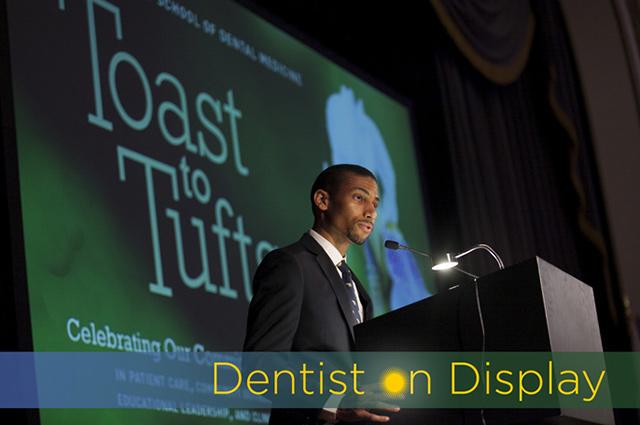Dentist on Display: Nicholas Gordon, D12

Dr. Nicholas Gordon’s passion to serve the community was instilled long before his acceptance into dental school. The untimely death of Deamonte Driver, a boy who died from a tooth abscess, was the first event that compelled Gordon to become interested in understanding health disparities.
Gordon explained that Driver died because his mother was unable to find a health care provider that accepted her insurance to provide dental treatment. “Even before coming to dental school, I knew that I wanted to serve underserved populations,” he said.
An additional catalyst occurred during a summer program at The University of Michigan when Gordon heard Dr. George Taylor speak about disparities in oral health. The combined interest of public health and dentistry led Gordon to pursue Tufts Dental, knowing that the school was developing a joint DMD/MPH program.
Gordon credits multiple mentors, including Dr. Wanda Wright and Dr. Catherine Hayes (former faculty members at Tufts) for helping him to reach his professional goals as a public health dentist. “One of the things that I can say about attending Tufts is that faculty members took interest in my wellbeing so that I could fulfill my goals. I’m not sure if I could have gotten that at other dental schools.”
Gordon received his DMD in 2012 and became the first graduate of Tufts’ joint DMD/MPH program in 2014. Currently working at Whittier Street Community Health Center in Roxbury, MA, he is also completing Certificates of Advanced Graduate Study in Dental Public Health and Pediatric Dentistry at Boston University.
As dental students prepare to take the next step to their careers, Gordon recommends that current students take advantage of various campus resources, attend alumni events and connect with Tufts alumni. He also recommends staying connected with classmates and networking with other professionals. In fact, it was the use of professional networking that ultimately helped Gordon secure his position at Whittier.
Gordon finds working at Whittier to be both rewarding and challenging. Some challenges include that approximately 85-90% of his patients are on Medicaid, many require an interpreter, and many patients don’t show up for appointments for a myriad of reasons. His typical day starts at 8 am with 18 patients scheduled on a double-schedule system. Gordon discussed the importance of running a double schedule to account for no shows, which happen frequently. His afternoon schedule returns to a single-schedule system. Community health centers have the additional burden of caring for large numbers of Medicaid patients since private practices in Massachusetts can limit the number of Medicaid patients they accept. Another challenge that Gordon is presented with is the depth of his patients’ dental needs.
“One of my biggest frustrations, and not just at Whittier, [is that] most health centers have limited time. It doesn’t leave time for patient education and prevention. It’s more treatment driven. I have worked to try to change that. I try to advocate for prevention rather than just treating disease.”
While some dental students may be hesitant to pursue public health because of apprehensions regarding income, Gordon views such claims as a misconception about the field. “You have to take into consideration the amount of [other] benefits [that you can receive]. These add up to dollars, but people don’t really consider that,” he said. Gordon stated the importance of knowing the elements of and negotiating a suitable compensation package. Such benefits include paid licensure renewals and decreased malpractice insurance costs, not to mention vacation time and employee healthcare benefits. Additionally, some areas are in greater need of dentists and may pay a community dentist more than in an area with less need.
Gordon also encouraged dentists to think broadly about ways to serve the community. “You don’t have to work for a community health center,” he said. “You can work in private practice. I would encourage practices to take Medicaid. You can balance community work with a part-time job. It’s certainly understandable [the financial concern]. We have tons of debt to pay. But, you can still practice community health.”
One statement that continues to resonate with Gordon is from Dr. Myron Allukian, the former dental director of the city of Boston and a past professor. Allukian stated to Gordon’s class, “When you’re getting ready to practice dentistry, our license is given to us by the public. Our obligation is to serve the people. Not just a certain aspect of the people, but everyone,” Gordon recalled. “That’s a driving force for me- an obligation to the people that I’m serving.”
-Marguerite M. Moore
If you are interested in nominating a recent TUSDM alum, please contact Marguerite Moore, Assistant Director of Student Affairs and Career Services, at marguerite.moore@tufts.edu. Visit the Dentist on Display archive.